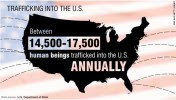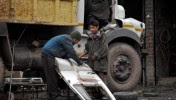
Human trafficking is a heinous crime that affects every region of the world. Some 72 per cent of detected victims are women and girls, and the percentage of child victims has more than doubled from 2004 to 2016, according to the UN Office on Drugs and Crime (UNODC). Most detected victims are trafficked for sexual exploitation; victims are also trafficked for forced labour, recruitment as child soldiers and other forms of exploitation and abuse.
Traffickers and terrorist groups prey on the vulnerable, from people in poverty to those caught up in war or who face discrimination. Nadia Murad, the first trafficking victim to serve as a United Nations Goodwill Ambassador, was justly co-awarded the 2018 Nobel Peace Prize for galvanizing international action to stop trafficking and sexual violence in conflict.
 Armed conflict, displacement, climate change, natural disasters and poverty exacerbate the vulnerabilities and desperation that enable trafficking to flourish. Migrants are being targeted. Thousands of people have died at sea, in deserts and in detention centres, at the hands of traffickers and migrant smugglers plying their monstrous, merciless trades.
Armed conflict, displacement, climate change, natural disasters and poverty exacerbate the vulnerabilities and desperation that enable trafficking to flourish. Migrants are being targeted. Thousands of people have died at sea, in deserts and in detention centres, at the hands of traffickers and migrant smugglers plying their monstrous, merciless trades.But everyday indifference to abuse and exploitation around us also takes a heavy toll. Indeed, from construction to food production to consumer goods, countless businesses and enterprises benefit from the misery.
Multilateral action has generated progress, including through the Palermo Convention and its Protocol to Prevent, Suppress and Punish Trafficking in Persons, Especially Women and Children. Most countries have the necessary laws in place, and some countries recently recorded their first trafficking convictions. But more needs to be done to bring transnational trafficking networks to justice and, most of all, to ensure that victims are identified and can access the protection and services they need.
The Sustainable Development Goals include clear targets to prevent abuse and exploitation, to eliminate all forms of violence against all women and girls, and to eradicate forced labour and child labour. On this World Day against Trafficking in Persons, let us reaffirm our commitment to stop criminals from ruthlessly exploiting people for profit and to help victims rebuild their lives.
António Guterres - United Nations Secretary General
|
|
|
|
|
|
|
|
|
|
|
|
|
The Global Sustainability Network ( GSN ) http://gsngoal8.com/ is pursuing the United Nations Sustainable Development Goal number 8 with a special emphasis on Goal 8.7 which ‘takes immediate and effective measures to eradicate forced labour, end modern slavery and human trafficking and secure the prohibition and elimination of the worst forms of child labour, including recruitment and use of child soldiers, and by 2025 end child labour in all its forms’.
The origins of the GSN come from the endeavours of the Joint Declaration of Religious Leaders signed on 2 December 2014. Religious leaders of various faiths, gathered to work together “to defend the dignity and freedom of the human being against the extreme forms of the globalization of indifference, such us exploitation, forced labour, prostitution, human trafficking” and so forth.
This special report is brought to you by IPS with support from the Riana Group.

IPS Daily Report - Formerly TerraViva
Editorial Coordinator: Thalif Deen
Managing Editor: Farhana Haque Rahman
Editorial team led by:
Nalisha Adams in Johannesburg
Estrella Gutierrez in Caracas with Stefanie Wildes and Veronica Firme in Montevideo
James Reinl, IPS UN Bureau in New York
Walter Garcia in Madrid with Mauro Teodori in Rome
Inter Press Service, Room S-407, United Nations, New York, N.Y. 10017
Email: wgarcia@ips.org
Website: http://www.ipsnews.
Copyright © 2019



































No hay comentarios:
Publicar un comentario